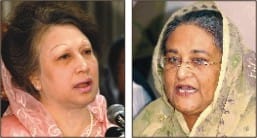Khaleda, Hasina agree to hold dialogue after Eid

Kheleda Zia and Sheikh Hasina, the country's two top politicians, 'unconditionally' agreed to sit together for a dialogue some time after Eid-ul-Fitr on Hasina's return from abroad, counsel of the two former premiers Barrister Rafiq-ul Huq said yesterday.
If they sit together and talk, not only their personal differences will be resolved, but the country will also be relieved of the current political crisis, the eminent lawyer believes.
The much anticipated talk between the traditional political archrivals is being considered by many as the most vital step forward now to reestablishing democracy in the country, since the move is expected to usher in qualitative changes in the body politic.
"Both leaders agreed to sit together for a dialogue. Neither of them put any condition," Barrister Rafiq-ul Huq, who is acting as the liaison between the two former heads of governments, told The Daily Star in his chamber yesterday afternoon.
He said BNP Chairperson Khaleda Zia was very positive about the meeting while Awami League President Sheikh Hasina also welcomed the move.
"Hasina said since she is currently outside the country, she will give a final decision after talking to her party colleagues on her return home," he added.
If they do not sit together, the barrister fears, the country might revert to the pre-1/11 situation.
Rafiq-ul Huq said he talked to Khaleda first and then to Hasina over the phone during his overseas trip.
In between his conversations with the two political party chiefs, he also talked to two advisers to the military backed caretaker government who had earlier approached him to be a part of the effort. He returned home yesterday.
Either as prime ministers or as opposition leaders, Hasina and Khaleda have been the two most important political figures in Bangladesh for more than 15 years since 1991, but they have been refusing to talk to each other, which many believe is the main reason for the 'politics of confrontation' in the country.
Explaining the initiative, Barrister Rafiq said both leaders should take lessons from the events of 1/11, and should sit together for a dialogue to sort out their 'misunderstandings', and to work together for the betterment of the country and its people.
He said neither of the parties might come back to power. There might be a third party coming to power or there might be a coalition government, he added.
But apart from leading their parties the two top leaders should work together in the country's interest, he observed.
Talking about elections, he said the government should take steps to hold the stalled parliamentary election first.
"They must go for the national poll first because there is no time left now for either the upazila or the city corporation elections."
Rafiq also said there will be no pre-set agenda for the meeting, the two leaders themselves will pick their topics during the talk.
"For example, they might decide that they will not boycott the parliament from now on, and bring new faces into politics."
Rafiq first talked to the media about the necessity for bringing the two political archrivals to a discussion table after Khaleda had been released on bail on September 11.
Following his statement the interim government requested him to take the initiative, eliciting the lawyer's acquiescence.
Asked why the government wants to bring the two leaders to a dialogue, he said it might be because its 'minus two' policy failed.
The lawyer said he will talk to Law Adviser AF Hassan Ariff soon to know if there is any new development in the government camp regarding the matter.
He said he took the initiative as a concerned citizen, but eventually the matter became the most talked about issue in the country.
"I believe more than 90 percent of the people now support the initiative."
"The people want that they sit together and resolve their misunderstandings, and through discussions take decisions regarding the fate of the country," he said adding, "It will also be good for both of them."
Rafiq said he will take up the matter immediately after Hasina returns home after the Eid.
When asked about the culture of violence in politics, he said violence will largely decrease if the two leaders sit together because it will have positive impact on the society narrowing down the gap between the rivals.
He said they (Khaleda-Hasina) should set up an example for the newcomers in politics through meeting each other. "Who will set up this example if they don't," he posed.
Khaleda has no objection to Rafiq's residence as a neutral venue, while Hasina informed the lawyer that she is not adequately updated about the happenings in the country right now as she is abroad, and will let her final decision known after discussing the matter with her party colleagues, the barrister said.
With the anticipated Hasina-Khaleda dialogue becoming visible on the horizon, the country's politics under the state of emergency is expected to take a new turn ahead of the general election tentatively scheduled for the third week of December, political observers believe.
Khaleda, who had been the country's premier from 1991 to 1996 and again from 2001 to 2006, was released from detention on bail while Hasina was paroled from detention in June on grounds of ill health.
Hasina, who was the prime minister from 1996 to 2001, is now in the US for treatment.
Both of them are facing corruption and extortion charges.
After the military backed caretaker government assumed state power in January last year following violent political turmoil mainly between BNP and AL there has been a reported move to keep the two top leaders off politics.
The 9th parliamentary election originally scheduled for January 22, 2007 was postponed following violent disputes between the two major parties.

 For all latest news, follow The Daily Star's Google News channel.
For all latest news, follow The Daily Star's Google News channel. 




Comments